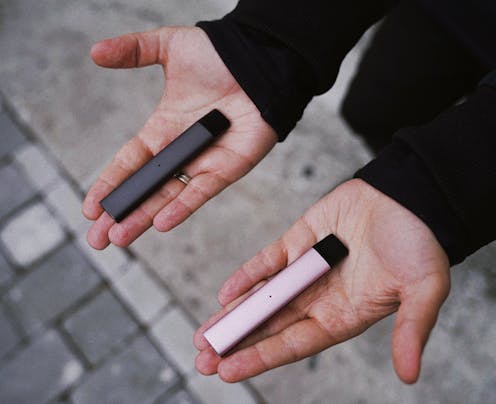My teen's vaping. What should I say? 3 expert tips on how to approach 'the talk'
- Written by Joshua Trigg, Research Fellow in Public Health, Flinders University

You’ve dropped your daughter off at her friend’s house and while cleaning the car, you find what looks like a USB drive on the passenger seat. It’s a disposable vape.
You’ve seen the news. Vapes or e-cigarettes are harmful[1] yet increasingly popular[2] with people her age.
You call to ask if the vape’s hers. It is and she’s been vaping occasionally for a few weeks. You say you’ll talk about it later.
But what will you actually say?
Read more: Should I give my teen alcohol? Just a sip, the whole can, or none at all?[3]
1. Know your facts
It’s important to be across accurate and up-to-date information about vaping. Evidence-based resources for parents and carers in Australia include:
the Lung Foundation’s evidence-based resources[4]
factsheets, videos[5] and webinars[6] from NSW Health that help dispel any misconceptions parents might have about vaping. This includes whether vapes are likely to contain nicotine and the accuracy of labelling
Quit Victoria’s resources for parents and teens, including brief guides[7] that cover the essentials on vaping, including busting a few myths.
A common theme across such resources for parents is to bring home the reality of vaping in terms of how many teens are actually doing it, what current health evidence shows, and why it’s more than just media coverage of incidents at schools.
In a nutshell, vapes are easy to access[8], teen vaping is common[9] and it’s becoming normalised[10] in this age group.
Our own unpublished research with young people aged 16-26, provides some insights. We’ve heard vaping called a “clean alternative” to smoking (it’s not), and a “social activity” at school or parties. One young participant has seen others “nic sick”, or nauseous from vaped nicotine[11].
There’s mounting evidence pointing to physical health harms[12] and unknown mental health risks[13] from vaping. There’s no reason for a teen to be vaping, even if adults might take this approach in quitting smoking[14]. Many vapes contain nicotine[15], whatever the label says, with the potential for dependence or addiction.
Read more: How can we reverse the vaping crisis among young Australians? Enforce the rules[16]
2. Listen more than speak
It might be tempting to deliver a lecture on the dangers of vaping. But conversations are more likely[17] to be effective[18] if they are clear, open, and constructive, with thought about how to focus on discussing health harms.
So use some of these tips, based on ones from the Alcohol and Drug Foundation[21]:
approach the conversation calmly, during a shared activity, such as walking the dog
consider questions your teen may ask, and how you want to respond
don’t assume, avoid accusations, show trust
no judging; really listen to their perspective (listen more than speak) and respect they have a different and unique worldview and opinions. Understand their social life[22] and create an environment where they can discuss this with you
don’t exaggerate, just stick to the facts. Remember, your teen may have already received vaping and health resources from school[23] and be aware of the health impacts and uncertainties about long-term health risks of vaping
tailor your discussion based on whether your teen vapes occasionally, is addicted and/or wants support to quit
respect their privacy
show that their health is your focus.
Read more: A parent's guide to why teens make bad decisions[24]
3. Support quitting
But what if it’s gone beyond trying vaping, and your teen feels they have a dependency or addiction?
Services such as Quitline[25], which traditionally provide counselling for people wanting to stop smoking, are increasingly receiving calls from teens[26] struggling with vaping-related nicotine dependence.
Parents can also call Quitline (phone: 13 78 48) to plan the conversation with a teenager about vaping. They can also contact a GP to help their teen treat nicotine dependence and related effects.
Extra resources about vaping for parents and teens are available in New South Wales[27], Victoria[28], Queensland[29], South Australia[30], Western Australia[31], Tasmania[32], Australia Capital Territory[33] and Northern Territory[34].
References
- ^ harmful (nceph.anu.edu.au)
- ^ popular (theconversation.com)
- ^ Should I give my teen alcohol? Just a sip, the whole can, or none at all? (theconversation.com)
- ^ evidence-based resources (lungfoundation.com.au)
- ^ factsheets, videos (www.health.nsw.gov.au)
- ^ webinars (www.pandc.org.au)
- ^ brief guides (www.quit.org.au)
- ^ easy to access (doi.org)
- ^ common (doi.org)
- ^ normalised (doi.org)
- ^ vaped nicotine (www.jmir.org)
- ^ physical health harms (nceph.anu.edu.au)
- ^ mental health risks (doi.org)
- ^ quitting smoking (www.cochranelibrary.com)
- ^ contain nicotine (www.health.nsw.gov.au)
- ^ How can we reverse the vaping crisis among young Australians? Enforce the rules (theconversation.com)
- ^ more likely (doi.org)
- ^ to be effective (doi.org)
- ^ Kindel Media/Pexels (www.pexels.com)
- ^ CC BY-SA (creativecommons.org)
- ^ Alcohol and Drug Foundation (adf.org.au)
- ^ Understand their social life (doi.org)
- ^ from school (myresources.education.wa.edu.au)
- ^ A parent's guide to why teens make bad decisions (theconversation.com)
- ^ Quitline (www.quit.org.au)
- ^ calls from teens (www.theguardian.com)
- ^ New South Wales (www.health.nsw.gov.au)
- ^ Victoria (www.vic.gov.au)
- ^ Queensland (quithq.initiatives.qld.gov.au)
- ^ South Australia (www.education.sa.gov.au)
- ^ Western Australia (www.healthywa.wa.gov.au)
- ^ Tasmania (www.health.tas.gov.au)
- ^ Australia Capital Territory (www.health.act.gov.au)
- ^ Northern Territory (www.quit.org.au)

















